School Uniform Finished: Ermolov Nikita The question of
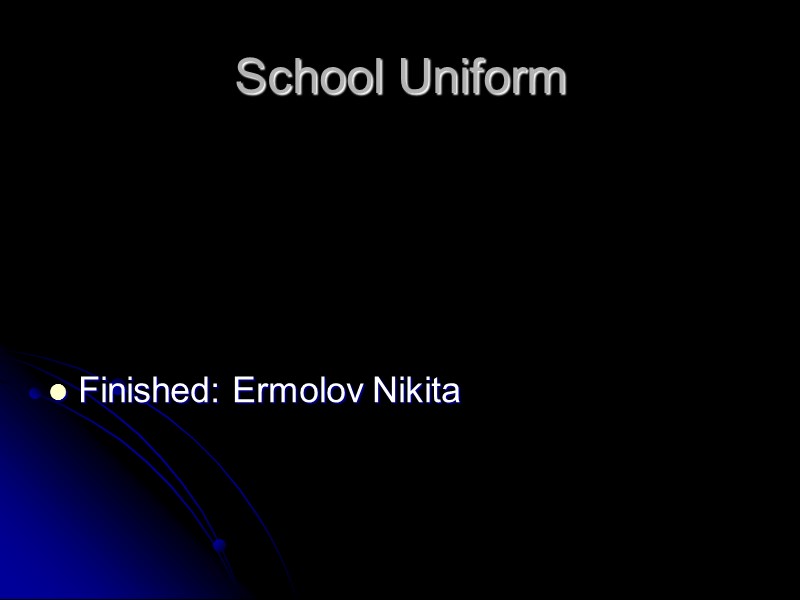
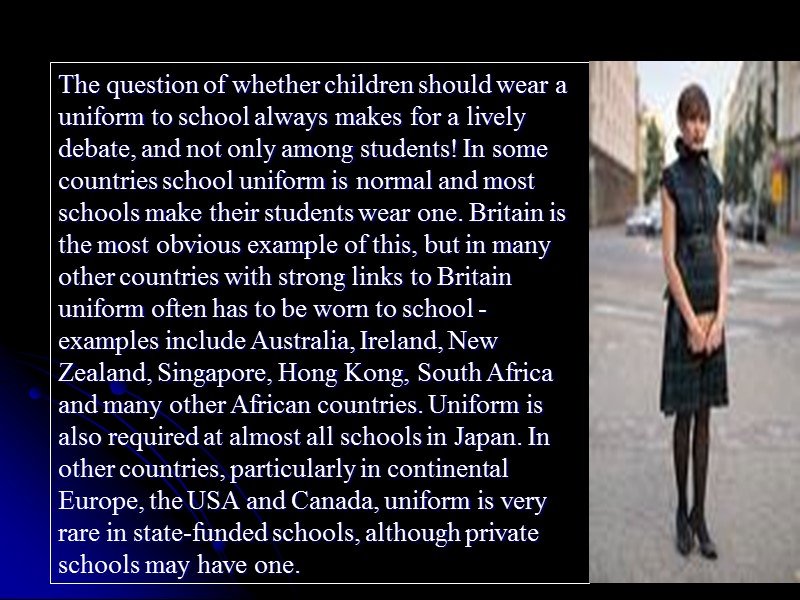
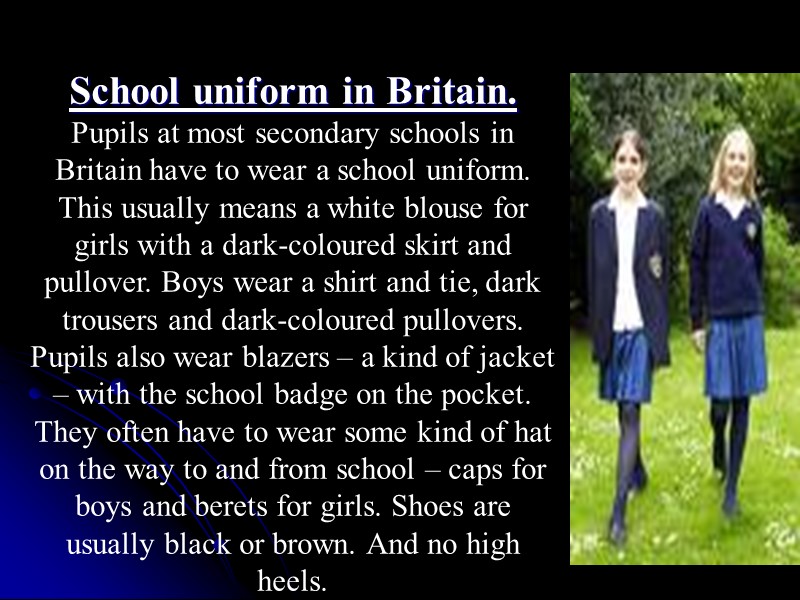
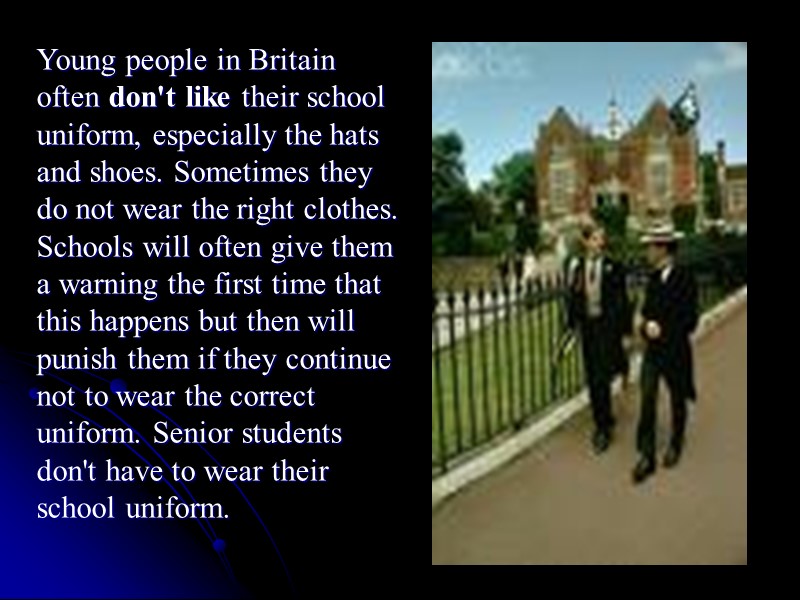
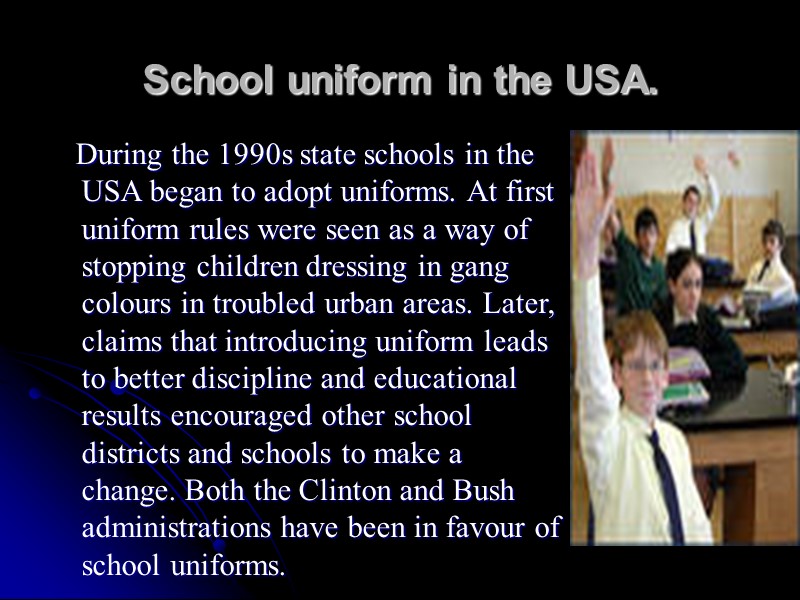
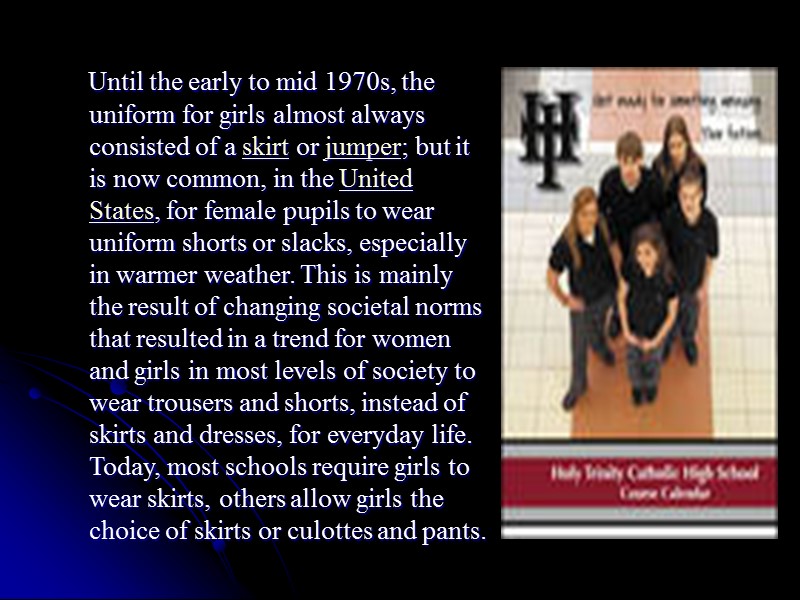
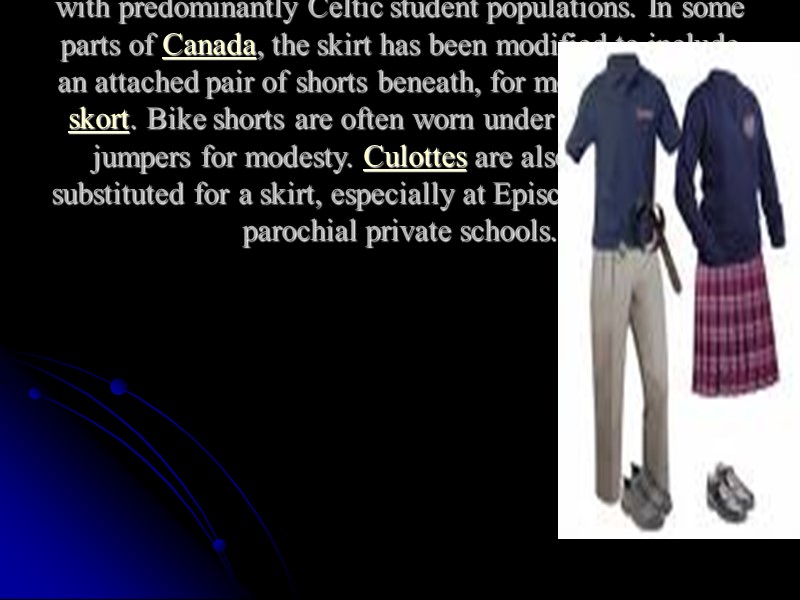
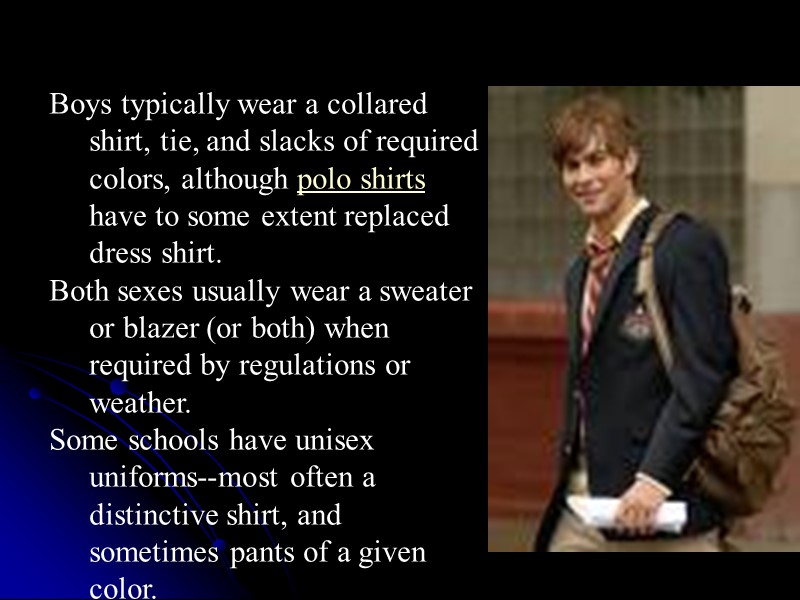
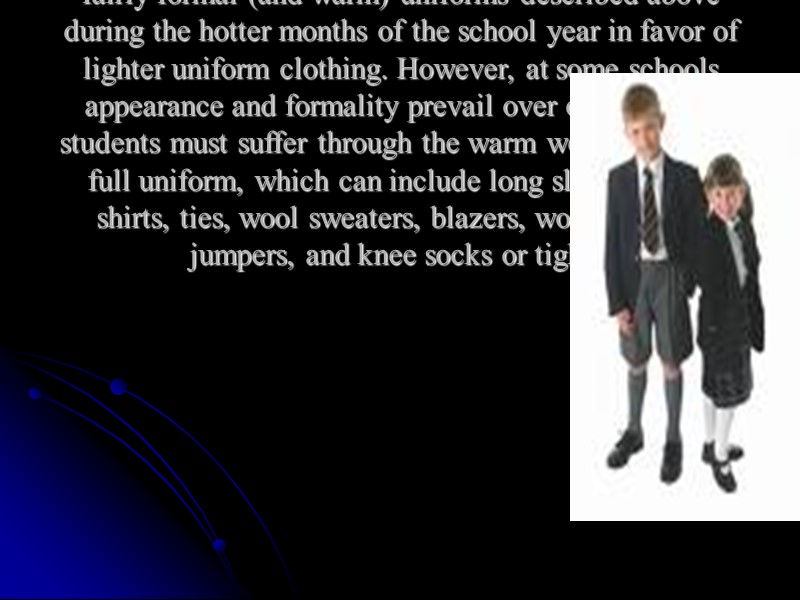
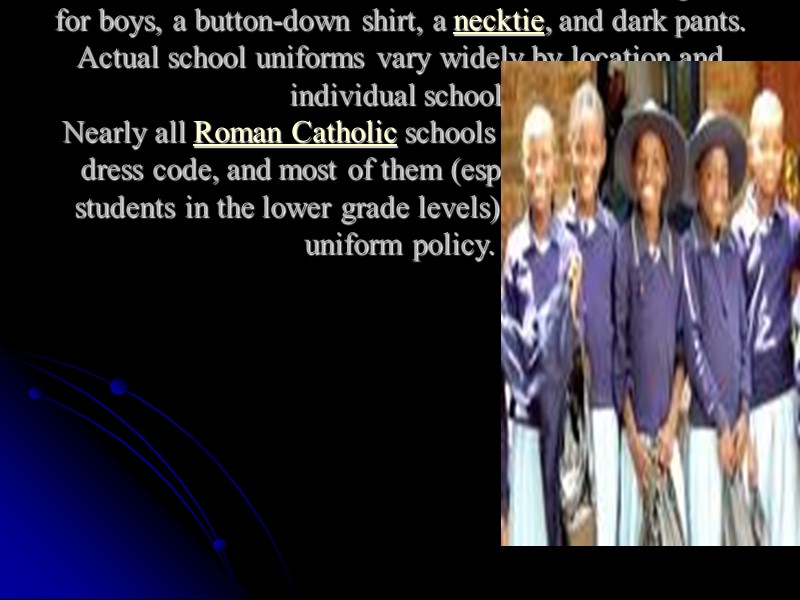
28830-shkolnaya_forma_ermolov_nikita.ppt
- Количество слайдов: 10
 School Uniform Finished: Ermolov Nikita
School Uniform Finished: Ermolov Nikita
 The question of whether children should wear a uniform to school always makes for a lively debate, and not only among students! In some countries school uniform is normal and most schools make their students wear one. Britain is the most obvious example of this, but in many other countries with strong links to Britain uniform often has to be worn to school - examples include Australia, Ireland, New Zealand, Singapore, Hong Kong, South Africa and many other African countries. Uniform is also required at almost all schools in Japan. In other countries, particularly in continental Europe, the USA and Canada, uniform is very rare in state-funded schools, although private schools may have one.
The question of whether children should wear a uniform to school always makes for a lively debate, and not only among students! In some countries school uniform is normal and most schools make their students wear one. Britain is the most obvious example of this, but in many other countries with strong links to Britain uniform often has to be worn to school - examples include Australia, Ireland, New Zealand, Singapore, Hong Kong, South Africa and many other African countries. Uniform is also required at almost all schools in Japan. In other countries, particularly in continental Europe, the USA and Canada, uniform is very rare in state-funded schools, although private schools may have one.
 School uniform in Britain. Pupils at most secondary schools in Britain have to wear a school uniform. This usually means a white blouse for girls with a dark-coloured skirt and pullover. Boys wear a shirt and tie, dark trousers and dark-coloured pullovers. Pupils also wear blazers – a kind of jacket – with the school badge on the pocket. They often have to wear some kind of hat on the way to and from school – caps for boys and berets for girls. Shoes are usually black or brown. And no high heels.
School uniform in Britain. Pupils at most secondary schools in Britain have to wear a school uniform. This usually means a white blouse for girls with a dark-coloured skirt and pullover. Boys wear a shirt and tie, dark trousers and dark-coloured pullovers. Pupils also wear blazers – a kind of jacket – with the school badge on the pocket. They often have to wear some kind of hat on the way to and from school – caps for boys and berets for girls. Shoes are usually black or brown. And no high heels.
 Young people in Britain often don't like their school uniform, especially the hats and shoes. Sometimes they do not wear the right clothes. Schools will often give them a warning the first time that this happens but then will punish them if they continue not to wear the correct uniform. Senior students don't have to wear their school uniform.
Young people in Britain often don't like their school uniform, especially the hats and shoes. Sometimes they do not wear the right clothes. Schools will often give them a warning the first time that this happens but then will punish them if they continue not to wear the correct uniform. Senior students don't have to wear their school uniform.
 School uniform in the USA. During the 1990s state schools in the USA began to adopt uniforms. At first uniform rules were seen as a way of stopping children dressing in gang colours in troubled urban areas. Later, claims that introducing uniform leads to better discipline and educational results encouraged other school districts and schools to make a change. Both the Clinton and Bush administrations have been in favour of school uniforms.
School uniform in the USA. During the 1990s state schools in the USA began to adopt uniforms. At first uniform rules were seen as a way of stopping children dressing in gang colours in troubled urban areas. Later, claims that introducing uniform leads to better discipline and educational results encouraged other school districts and schools to make a change. Both the Clinton and Bush administrations have been in favour of school uniforms.
 Until the early to mid 1970s, the uniform for girls almost always consisted of a skirt or jumper; but it is now common, in the United States, for female pupils to wear uniform shorts or slacks, especially in warmer weather. This is mainly the result of changing societal norms that resulted in a trend for women and girls in most levels of society to wear trousers and shorts, instead of skirts and dresses, for everyday life. Today, most schools require girls to wear skirts, others allow girls the choice of skirts or culottes and pants.
Until the early to mid 1970s, the uniform for girls almost always consisted of a skirt or jumper; but it is now common, in the United States, for female pupils to wear uniform shorts or slacks, especially in warmer weather. This is mainly the result of changing societal norms that resulted in a trend for women and girls in most levels of society to wear trousers and shorts, instead of skirts and dresses, for everyday life. Today, most schools require girls to wear skirts, others allow girls the choice of skirts or culottes and pants.
 School uniform in Canada. A kilted skirt is sometimes worn, especially in schools with predominantly Celtic student populations. In some parts of Canada, the skirt has been modified to include an attached pair of shorts beneath, for modesty called a skort. Bike shorts are often worn under girls' skirts or jumpers for modesty. Culottes are also sometimes substituted for a skirt, especially at Episcopalian or non-parochial private schools.
School uniform in Canada. A kilted skirt is sometimes worn, especially in schools with predominantly Celtic student populations. In some parts of Canada, the skirt has been modified to include an attached pair of shorts beneath, for modesty called a skort. Bike shorts are often worn under girls' skirts or jumpers for modesty. Culottes are also sometimes substituted for a skirt, especially at Episcopalian or non-parochial private schools.
 Boys typically wear a collared shirt, tie, and slacks of required colors, although polo shirts have to some extent replaced dress shirt. Both sexes usually wear a sweater or blazer (or both) when required by regulations or weather. Some schools have unisex uniforms--most often a distinctive shirt, and sometimes pants of a given color.
Boys typically wear a collared shirt, tie, and slacks of required colors, although polo shirts have to some extent replaced dress shirt. Both sexes usually wear a sweater or blazer (or both) when required by regulations or weather. Some schools have unisex uniforms--most often a distinctive shirt, and sometimes pants of a given color.
 Uniforms may vary based on time of year. At many schools, students are excused from having to wear the fairly formal (and warm) uniforms described above during the hotter months of the school year in favor of lighter uniform clothing. However, at some schools appearance and formality prevail over comfort and students must suffer through the warm weather in their full uniform, which can include long sleeved dress shirts, ties, wool sweaters, blazers, wool skirts or jumpers, and knee socks or tights.
Uniforms may vary based on time of year. At many schools, students are excused from having to wear the fairly formal (and warm) uniforms described above during the hotter months of the school year in favor of lighter uniform clothing. However, at some schools appearance and formality prevail over comfort and students must suffer through the warm weather in their full uniform, which can include long sleeved dress shirts, ties, wool sweaters, blazers, wool skirts or jumpers, and knee socks or tights.
 The Catholic school uniform in Canada consists of a pleated plaid skirt or jumper (a sleeveless dress), Mary Jane or saddle shoes, a blouse, and a sweater, for girls; for boys, a button-down shirt, a necktie, and dark pants. Actual school uniforms vary widely by location and individual school. Nearly all Roman Catholic schools have some form of dress code, and most of them (especially those with students in the lower grade levels) have a mandatory uniform policy.
The Catholic school uniform in Canada consists of a pleated plaid skirt or jumper (a sleeveless dress), Mary Jane or saddle shoes, a blouse, and a sweater, for girls; for boys, a button-down shirt, a necktie, and dark pants. Actual school uniforms vary widely by location and individual school. Nearly all Roman Catholic schools have some form of dress code, and most of them (especially those with students in the lower grade levels) have a mandatory uniform policy.
